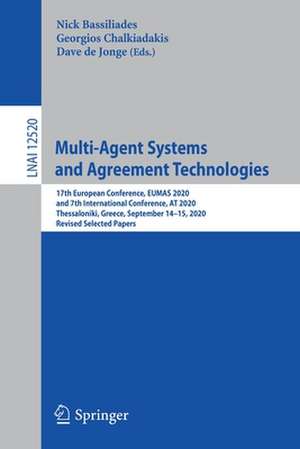Multi-Agent Systems and Agreement Technologies: 17th European Conference, EUMAS 2020, and 7th International Conference, AT 2020, Thessaloniki, Greece, September 14-15, 2020, Revised Selected Papers: Lecture Notes in Computer Science, cartea 12520
Editat de Nick Bassiliades, Georgios Chalkiadakis, Dave de Jongeen Limba Engleză Paperback – 5 ian 2021
Din seria Lecture Notes in Computer Science
- 20%
 Preț: 1061.55 lei
Preț: 1061.55 lei - 20%
 Preț: 307.71 lei
Preț: 307.71 lei - 20%
 Preț: 438.69 lei
Preț: 438.69 lei - 20%
 Preț: 579.30 lei
Preț: 579.30 lei -
 Preț: 410.88 lei
Preț: 410.88 lei - 17%
 Preț: 427.22 lei
Preț: 427.22 lei - 20%
 Preț: 596.46 lei
Preț: 596.46 lei - 15%
 Preț: 448.04 lei
Preț: 448.04 lei - 20%
 Preț: 353.50 lei
Preț: 353.50 lei -
 Preț: 389.49 lei
Preț: 389.49 lei - 20%
 Preț: 309.90 lei
Preț: 309.90 lei - 20%
 Preț: 645.28 lei
Preț: 645.28 lei - 20%
 Preț: 763.23 lei
Preț: 763.23 lei - 15%
 Preț: 580.46 lei
Preț: 580.46 lei - 20%
 Preț: 310.28 lei
Preț: 310.28 lei - 20%
 Preț: 655.02 lei
Preț: 655.02 lei - 20%
 Preț: 1183.14 lei
Preț: 1183.14 lei - 20%
 Preț: 340.32 lei
Preț: 340.32 lei -
 Preț: 449.57 lei
Preț: 449.57 lei - 20%
 Preț: 591.51 lei
Preț: 591.51 lei - 18%
 Preț: 938.83 lei
Preț: 938.83 lei - 20%
 Preț: 337.00 lei
Preț: 337.00 lei - 20%
 Preț: 649.50 lei
Preț: 649.50 lei - 20%
 Preț: 607.40 lei
Preț: 607.40 lei - 20%
 Preț: 1414.79 lei
Preț: 1414.79 lei - 20%
 Preț: 1024.44 lei
Preț: 1024.44 lei - 20%
 Preț: 583.40 lei
Preț: 583.40 lei - 20%
 Preț: 453.32 lei
Preț: 453.32 lei - 20%
 Preț: 575.49 lei
Preț: 575.49 lei - 20%
 Preț: 1075.26 lei
Preț: 1075.26 lei - 20%
 Preț: 585.88 lei
Preț: 585.88 lei - 20%
 Preț: 825.93 lei
Preț: 825.93 lei - 17%
 Preț: 360.20 lei
Preț: 360.20 lei - 20%
 Preț: 763.23 lei
Preț: 763.23 lei - 20%
 Preț: 340.32 lei
Preț: 340.32 lei - 20%
 Preț: 504.58 lei
Preț: 504.58 lei - 20%
 Preț: 369.13 lei
Preț: 369.13 lei - 20%
 Preț: 580.93 lei
Preț: 580.93 lei - 20%
 Preț: 343.62 lei
Preț: 343.62 lei - 20%
 Preț: 350.21 lei
Preț: 350.21 lei - 20%
 Preț: 583.40 lei
Preț: 583.40 lei - 20%
 Preț: 583.40 lei
Preț: 583.40 lei - 15%
 Preț: 438.59 lei
Preț: 438.59 lei - 20%
 Preț: 341.95 lei
Preț: 341.95 lei - 20%
 Preț: 238.01 lei
Preț: 238.01 lei - 20%
 Preț: 538.30 lei
Preț: 538.30 lei
Preț: 348.57 lei
Preț vechi: 435.71 lei
-20% Nou
Puncte Express: 523
Preț estimativ în valută:
66.71€ • 69.39$ • 55.07£
66.71€ • 69.39$ • 55.07£
Carte tipărită la comandă
Livrare economică 15-29 aprilie
Preluare comenzi: 021 569.72.76
Specificații
ISBN-13: 9783030664114
ISBN-10: 3030664112
Pagini: 608
Ilustrații: XIV, 608 p. 172 illus., 133 illus. in color.
Dimensiuni: 155 x 235 mm
Greutate: 0.86 kg
Ediția:1st ed. 2020
Editura: Springer International Publishing
Colecția Springer
Seriile Lecture Notes in Computer Science, Lecture Notes in Artificial Intelligence
Locul publicării:Cham, Switzerland
ISBN-10: 3030664112
Pagini: 608
Ilustrații: XIV, 608 p. 172 illus., 133 illus. in color.
Dimensiuni: 155 x 235 mm
Greutate: 0.86 kg
Ediția:1st ed. 2020
Editura: Springer International Publishing
Colecția Springer
Seriile Lecture Notes in Computer Science, Lecture Notes in Artificial Intelligence
Locul publicării:Cham, Switzerland
Cuprins
Intelligent agents and MAS applications.- Towards a Theory of Intentions for Human-Robot Collaboration.- Decentralised Control of Intelligent Devices: A Healthcare Facility Study.- Decentralised Multi-Intersection Congestion Control for Connected Autonomous Vehicles.- Congestion Management for Mobility-on-Demand Schemes that use Electric Vehicles.- Disaster Response Simulation as a Testbed for Multi-Agent Systems.- Mechanisms, Incentives, Norms, Privacy.- Rewarding miners: bankruptcy situations and pooling strategies.- A Game-Theoretical Analysis of Charging Strategies for Competing Double Auction Marketplaces.- Agents for Preserving Privacy: Learning and Decision Making Collaboratively.- Open Social Systems.- A Faithful Mechanism for Privacy-Sensitive Distributed Constraint Satisfaction Problems.- Incentivising Exploration and Recommendations for Contextual Bandits with Payments.- Emotional Agents Makea (Bank) Run.- Autonomous Agents.- An Interface for Programming Verifiable Autonomous Agents in ROS.- Integrated Commonsense Reasoning and Deep Learning for Transparent Decision Making in Robotics.- Combining Lévy Walks and Flocking for Cooperative Surveillance using Aerial Swarms.- Single-Agent Policies for the Multi-Agent Persistent Surveillance Problem via Artificial Heterogeneity.- Explaining the influence of prior knowledge on POMCP policies.- EUMAS 2020 Best Papers Session.- Approximating Voting Rules from Truncated Ballots.- Mechanism for Distributed Meeting Scheduling.- EUMAS-AT 2020 Joint Session.- An argumentation-based approach to generate domain-specific explanations.- Distributed multi-issue multi-lateral negotiation using a divide and rule approach.- Increasing negotiation performance at the edge of the network.- Challenges and Main Results of the Automated Negotiating Agents Competition.-Optimal Majority Rule Versus Simple Majority Rule.- Evaluating Crowdshipping Systems with Agent-Based Simulation.- Agent-based models, Social choice, Argumentation, Model-checking.- Measuring the Strength of Rhetorical Arguments.- Understanding the role of values and norms in practical reasoning.- Predicting the winners of Borda, Kemeny and Dodgson elections with supervised machine learning.- From Virtual Worlds to Mirror Worlds: A Model and Platform for Building Agent-based eXtended Realities.- Model-checking Information Diffusion in SocialNetworks with PRISM 452.- "Roads? Where we’re going we don’t need roads." Using Agent-based modeling to analyze the economic impact of Hyperloop introduction on a supply chain.- Sensitivity to Initial Conditions in Agent-based Models.-: Agent-oriented software engineering, Game Theory, Task Allocation, Learning.- Statecharts and Agent Technology: The Past and Future.- A Game Of Double Agents: Repeated Stackelberg Games with Role Switch.- Learning Summarised Messaging through Mediated Differentiable Inter Agent Learning.- Integrating Deep Learning and Non-monotonic Logical Reasoning for Explainable Visual Question Answering.- Multiagent Task Coordination as Task Allocation Plus Task Responsibility.- Anytime and Efficient Coalition Formation with Spatial and Temporal Constraints.
